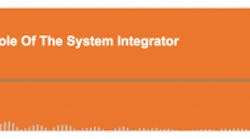Remaking Industry Podcast: The Evolving Role Of The System Integrator
Chris: Welcome to the Smart Industry podcast, "Remaking Industry," where we dive deep into the tools, techniques and technologies that are accelerating digital transformation. Today we are joined by Jose Rivera. Jose is the CEO of the Control System Integrators Association (CSIA). We're talking about the future of work for system integrators. Jose, how are you?
Jose: I'm doing great. Thanks for having me on your podcast.
Chris: Yeah. Thanks for joining us. It's always good to touch base with you, and pick your brain a little bit about this field here. For those in the audience who are unaware, give us a little rundown on what the Control System Integrators Association, CSIA, what that body is and your role within it.
Jose: The Control System Integrators Association is an association of around 400 system integration companies, and around 100 vendor partners that supply the system integration community with either automation equipment, software, or services to the system integration community. We have been around since 1994 and we focus on helping system integrators building better businesses. That's what we focus on.
Chris: Okay, excellent. We always like to get a little personality from the people we have on the podcast here. Let me ask you kind of a fun question. What is a hobby of yours, Jose? Outside of work what interests you? What's a hobby?
Jose: I like riding the bicycle and I also like fixing the bicycles, because I have several in my collection. Nothing too fancy. I have revamped some bicycles that I saved from the trash can from our neighbor, but riding the bicycle is for me a lot of fun.
Chris: Terrific. And where's home base for you? Where are you at? Anywhere with mountains or hills?
Jose: No. We are in the second flattest state of the nation, it's called Illinois, and I live just north of Chicago.
Chris: Okay. Yeah, I'm here with you in Illinois and I'm always looking for hills to ride. Tell me, Jose, how is the role of the system integrator changing, as digital transformation and manufacturing gains momentum?
Jose: It is very interesting because what we have seen is that the first phases of digital transformation, the ones that involve connection and making data visible, they may not look very different from what system integrators have done in the past. But they are creating the base for the next phases, which are related more to predictive, adaptive and intelligent. And so, in our community of system integrators, we have some that view that nothing has changed. And I have done system integration for...digital transformation for the past 25 years, what I would say is that, it's not the same. The scope has changed in a very big way. What you were doing before was very much focused on the plant in the past. Today, you're including supply chains, you're including your end user, customer, you're also involving your workforce much more than you were ever before. And with the data richness that we have today, and the availability of relatively cheap computing power, you're leveraging this much more than you were able to do in the past.
Chris: Yeah. And those workforces are being distributed just like their assets are, and that, you know, no longer exists within a facility. You know, as we gain momentum with this Industry 4.0 stuff, and this digital transformation stuff, and as everybody gets a greater understanding of these, you know, tools, techniques, and technologies that are central to this stuff, do you find that people you interact with have a better understanding of who and what system integrators are, in a general sense in the industrial space? Is there a greater understanding of what you guys do?
Jose: I think so. I think that people understand that, I have a problem, I have this possible solution components, and somebody must put all of this together. And that's normally the system integrator. So, yes, I think it's like the missing link between components and the real solution. But system integrators, the market is one of many, many companies, mostly smaller companies, so they don't have the marketing muscle that larger players have. And so I think CSIA plays a role. We have an electronic directory that helps these companies gain some relevancy on the internet and allowing end users to find them.
Chris: Yeah. And we just talked about how, you know, everything in this space is diversifying. What new responsibilities are falling into the lap of the system integrator as we, you know, progress further down the road with digitalization?
Jose: Yes. I find that system integrators, even on the very basics that I was explaining before about gaining access connectivity and access to the data, that is already quite a challenge. I mean, it's something that doesn't stand out very much. But if you go to any installed base, you will find a lot of legacy equipment. Some of this equipment or most of this equipment is proprietary, so just gaining access to the data and putting it all on a platform that you can then leverage across the plant or across plants, it's quite the accomplishment. And so that requires a lot of ingenuity and creativity by system integrators to make that happen. But then, once you are there, now, this is when you're talking about, like, new capabilities and responsibilities, which is now preparing to leverage the data. So you're talking about data analytics, for example, data visualization. And these types of things, that is newer, I think those new fields require more specific knowledge in your vertical, or your application within the vertical. And I think that's going to be more the trend.
Chris: Kind of a flip-side of that coin, as automation programs develop, and as roles change, and things like that, and IT, OT teams become more alike, are there any responsibilities of the system integrator that are going the wayside? Are roles being adopted by others that were formally the domain of the system integrator?
Jose: I'm not completely sure about that going to the wayside. I just think it's like in an increasing scope of solutions that is demanded from system integrators, maybe certain areas remain similar to what they were in the past. And I'm thinking about control panel assembly, right? I have seen, through our surveys, how still an important part of our members, around 80%, design their control panels, but around 60% will build them, which means that some of the system integrators no longer are in buildings or offices that even allow you to have a control panel assembly, right? And so they're outsourcing that to specialists. And so these are companies that then will specialize in just building control panels, in a very efficient way. But these are of the things that, let's say, in the past, it was part of what you were providing as a control system integrator. And that's why I'm saying, it's like this whole solution scope for integrators has been expanding. And so some things that were a must have in the past, today's an optional, but you're now specializing in newer areas, and like you were saying, more on the IT side of things.
Chris: Yeah. Interesting. And how's the pandemic coming into play here? How's that changing the system integrators' work?
Jose: It's very interesting because the theme of our next conference, which is going to be in June 2022, in Denver, Colorado, the theme is, "The Future of Work," just like the name of this podcast. And what we're going to be focusing on is going to be, who, which refers to the people, the where, which refers to the location and access to market, et cetera, and the what, which is more of this type of work that you will be doing in the future, very much related to digital transformation.
So how has it impacted? Well, from the people side of things, in the past, most people would come to the office. And so everybody started working remotely, because it was mandated, that had huge impacts on the culture, the dynamics. And now, everybody is thinking about returning to more of a hybrid mode, which brings another set of questions. You know, how do you work together?
And in our service, what we have found is that, it's the younger people that want to go back to the office because, I think...
Chris: Oh.
Jose: Yes, these are the generations that have grown digitally, and are very comfortable with tools, but what I think that they're missing is this ability to be nurtured from the previous generation, right? So have like the ability to walk around the corner and say, "Hey, can you remind me, where do we do this, how do we do that?" as opposed to waiting for a formal meeting. And I think that that is, like, very interesting.
I think the other thing that I was just recently learning is that the office space also provided, like, this natural way of meeting and developing relationships. And some of these relationships extended beyond the traditional workspace. And that I think, it's a little bit harder to do it, if it's just digital. So I am a very big supporter of this hybrid mode, which tries to combine both things together.
Let me also say one more thing, which is like, during this pandemic, we then ended up with this big resignation, labor shortage, all these good things. And before the pandemic, system integrators were already describing the biggest challenge as attract, retain and develop talent. And so the pandemic just made it harder. So this is going to be one of the elements where system integrators are going to be having to figure out, how can we stand out from all the other players that want to take this talent for their companies? In the past, there were some of these players that were not competitors to resources for system integrators like the technology companies, but now, they are.
And so things will have to be made very attractive, such that these new resources can find the motivation and join system integration companies. They have done that in the past. So I'm totally optimistic about our system integrators' ability to design something that is attractive and relevant.
Chris: Yeah. And then, you know, we touched on it a minute ago, but in that same vein there, you know, IT, OT teams are converging their roles, responsibilities, and focuses and capabilities are aligning to a pretty good degree. How does that affect the world of the system integrator?
Jose: Yes. I think that, you know, in the past there, we have had many years of this debate about IT versus OT. And I think that that is, like, going away, to a large extent, because system integrators have been increasing their IT capabilities. So they're gaining a better understanding of what the other side thinks. And I also think the IT side has realized that there are a lot of real-world challenges down there at the OT side of things, you know, making things work, going into control cabinets and extracting data from proprietary systems, and the whole thing. So I think both sides have developed a little better understanding and respect for each other, and I think that the lines will continue to blur between the two camps.
Chris: Yeah. Particularly, with young people coming in, you're not going to see that distinct of a difference between the two camps. Just the norm is going to be convergence as opposed to a goal that you have to meet.
Jose: Great point.
Chris: Kind of big picture, last question for you, Jose Rivera, with the Control System Integrators Association, what most excites you about the near future of Industry 4.0?
Jose: So what I felt was that this pandemic, one silver lining of the pandemic was that it pushed a lot of this digital transformation, Industry 4.0, whatever you want to call it, it pushed it ahead. There were in the past, when all of this started, there were always these convenient excuses about, well, we don't do this here. We're not comfortable with cybersecurity. And I'm not minimizing the challenges along the way, but they had to be addressed, and now they were forced to be addressed. To me that was a great thing because it was, like, a big hurdle for making progress here. What I also think is that what digital information and Industry 4.0 allows is a real way to address current labor shortages, supply chain issues, you know, supply chain robustness. So, I mean, it's just sort of, like, the perfect time for these things that were there but now they're going to get the big impetus. I've heard from some of our system integration members how, in the past, some projects did not clear the return-on-investment hurdle by the end user, you know, bosses.
But with this whole pandemic thing, these rate of return hurdles were lowered, for certain areas. For example, once that allowed to reduce the worker density on the operations floor because of, you know, contagion, and the other one was on the warehousing, which was always like an area of not a lot of focus, that also received a lot of focus and, you know, improved conditions to justify projects. So I think system integrators will enjoy a good outlook for the coming years. Again, there are challenges like can they make it happen with all these labor related challenges and shortages?
Chris: Yeah, yeah, interesting stuff. Jose Rivera, CSIA CEO, thank you for joining us today, on the "Remaking Industry" podcast.
Jose: You're welcome. Thank you for having me again, Chris.
Chris: Thank you. And to our listeners, as always, we encourage you to go out and make it a smart day.




